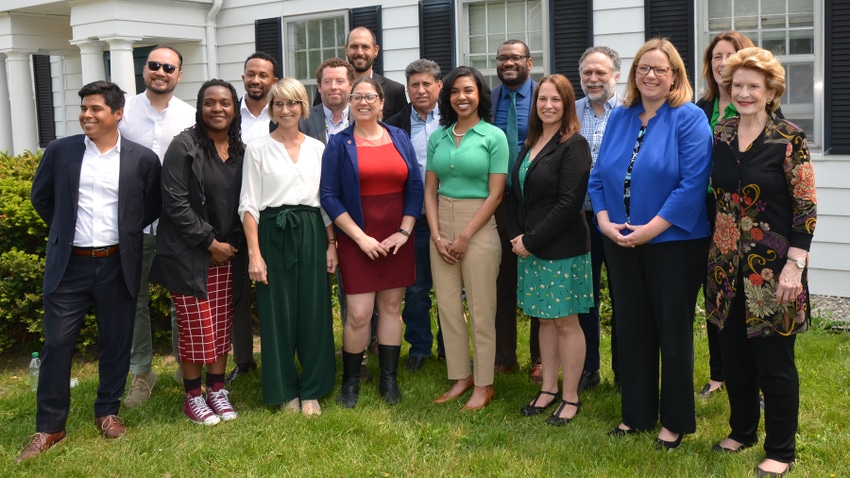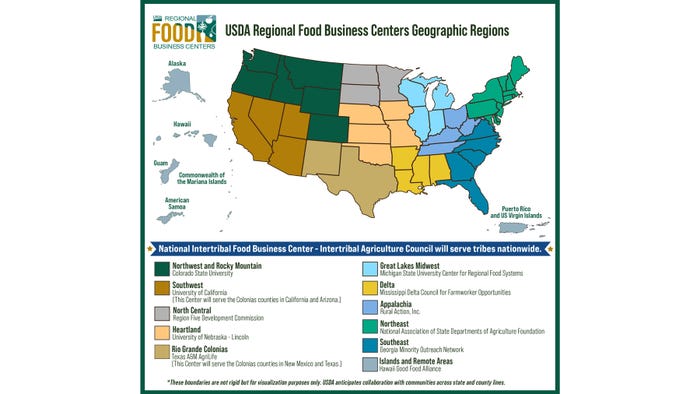
Citing the pandemic and how it rocked the food system on many levels, USDA is pumping $400 million into 12 regional food business centers across the country, including designating Michigan State University as the Great Lakes Midwest Regional Food Center.
A total of $20 million over the next five years will be funneled through the Michigan State University Center for Regional Food Systems to help farms and food businesses in Michigan, Indiana, Illinois and Wisconsin access new markets and navigate federal, state and local resources.
It also includes the Menominee Indian Tribe Department of Agriculture and Food Systems, which is based out of Wisconsin but will provide tribal coordination throughout the area.
Officials, including USDA Undersecretary Jenny Lester Moffitt, Sen. Debbie Stabenow, CRFS Director M. Jahi Johnson-Chappell, and MSU Dean of the College of Agriculture and Natural Resource Kelly Millenbah and others were on the MSU campus May 22 for a roundtable discussion with stakeholders and a press conference.
“It’s about how we get the products from new farmers and food entrepreneurs onto local tables,” Millenbah said. “And that's where the Great Lakes Midwest Regional Food Business Center is poised to make an impact. This amazing team stands ready to build local food systems that are more diverse, fair, sustainable and profitable.”
The centers will work with USDA to award funding to projects that expand capacity for the collection, processing, manufacturing, storing, transporting, wholesaling and distribution of food products — including specialty crops, dairy, grains for human consumption and other food products, except for meat and poultry (covered under other programs).
Direct assistance
More than $10 million will be distributed directly to technical assistance providers and eligible business owners. Small- to midsized and historically marginalized food and farm business owners will be prioritized for business builder awards.
Technical assistance will include business coaching, increasing profitability, accessing new markets and connecting with resources across the region.
“I just want to emphasize the commitment that MSU has made as part of this exciting opportunity, $10 million will go directly to communities,” said M. Jahi Johnson-Chappell. “We secured a waiver from MSU for the overhead on this money, so all $10 million dollars go to support communities.”
Citing shortcomings emphasized by the pandemic, Moffit said the program aims to expand the resiliency of the food system by strengthening local and regional markets and providing new and better markets for producers.

“We want to make more nutritious food available for communities and our own communities, and then strengthen rural communities by investing locally in good-paying jobs and shifting our food dollar back to the family farm,” she said.
The key partners will serve as network coordinators for their respective geographic areas: the Chicago Food Policy Action Council, Northwest Indiana Food Council, Food Finance Institute of the University of Wisconsin System, and the Menominee Indian Tribe of Wisconsin Department of Agriculture and Food Systems. CRFS will also serve as the coordinator for Michigan.
Stabenow said, “The pandemic really put a bright light on the fact that we can't go on without strengthening the local and regional food systems. We also know that we're building the connections between producers and businesses. That's what this is about. We’re providing a more nimble situation and broader access to markets. It’s all about connections, and we need to be providing food closer to home and that's what this is allowing us to do.”
The center is also designed to help farmers and food businesses access USDA programs and technical assistance more effectively more easily.
“We’re looking at how to take a product from idea to fruition, making sure that they're facilitating the linkages throughout the supply chain because there are many linkages in the supply chain that can be difficult for a farmer for a food producer, particularly underserved producers, to be able to navigate,” Lester Moffit said. “I am very passionate about locally led solutions and communities because I know communities know what's best for their own community.”
This program complements a previously announced USDA investment of $3.45 million to Michigan State University Center for Regional Food Systems.
The funding, provided by the American Rescue Plan, will support inclusive technical assistance for historically underserved producers in Michigan. Over the next five years, MSU CRFS will work with MSU Extension, Michigan Food and Farming Systems and the Julian Samora Institute to develop resources for inclusive farm business engagement.
About the Author(s)
You May Also Like






